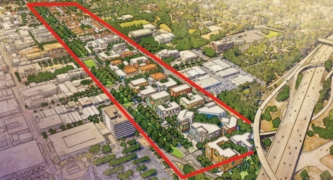
Efforts play out to determine the future of a 50-acre tract once envisioned as the path of an extension of the 710 Freeway, City officials are grappling with a lack of detailed records about how the state acquired hundreds of properties decades ago, often through a process known as “hardship acquisition.”
The missing historical data presents a challenge for a city-appointed task force charged with assessing the fairness of compensation provided to property owners displaced by the aborted freeway project and developing recommendations for how to utilize the land, which has sat largely vacant since the 1970s.
“There are no records kept by the state about the properties purchased via hardship acquisition,” Elysha Palusek, a consultant with the historical resources firm ARG, told the task force at a recent meeting. “We are obtaining that information as much as possible via other means.”
Hardship acquisition allows property owners to request that the government buy their land in advance of a planned project, often due to economic circumstances. It differs from eminent domain, in which the government forces the sale of private property for public use.
“There’s a bigger picture in play,” said Danny Parker, Chair of the Reconnecting Communities 710 Advisory Group. “I want to see data about the prices paid under the various methods. What were the differences in prices? That is what we need to see. We need to fully understand what happened at that time.”
Caltrans seized hundreds of homes in Pasadena, South Pasadena and El Sereno to make way for an ill-fated freeway extension. The City reclaimed a portion of that property several years ago.
Those other means, Palusek said, include combing through city directories, Sanborn maps, Caltrans right-of-way maps, and old newspaper articles. But she cautioned that “as we have undertaken our research, we have discovered limitations that we were not expecting.”
One key limitation: a lack of access to detailed U.S. Census records from 1960 and 1970 that could shed light on the demographics of displaced residents. Federal privacy laws restrict access to such records for 72 years, meaning the 1950 Census is the latest publicly available.
Task force members expressed frustration at the gaps in the historical record. “I would really like to know about that?” said Jose Luis Correa.
The task force’s research has determined that the state acquired about 300 parcels in Pasadena through hardship acquisition or eminent domain to assemble land for the 710 extension between 1968 and 1971. But beyond a list of names of property owners and purchase prices, details are scant.
Group Member Joel Bryant said getting to the bottom of how much displaced property owners were paid is crucial for the task force’s work.
“In order for us to do a good job recommending public policy, dealing with the past and dealing with the future, we need to have data on who lived there and how much they were paid,” he said.
Families of several members of the task force lost their homes to make way for the freeway extension. However, many of them were just children when that occurred.
Some task force members raised concerns that property owners may have been underpaid.
“Historically and especially in neighborhoods of color, what was an appraised value?” said Tina Williams. “So I think that is where we have to look at the nuance of this and maybe looking at the architect, a house, a similar home that was valued at the same time to one that was displaced might shed some light as well.”
Nurmela, the historical consultant, said her firm is working to fill in the blanks by cross-referencing acquisitions against other property records and anticipated that an oral history project may also help provide missing details.
But she said it remains to be seen how complete a picture will emerge from the jigsaw pieces of archival maps, newspaper clippings and the memories of those who lived through an upheaval that upended hundreds of households a half-century ago.
“We’re really hopeful that the oral histories will help fill that out,” she said.



















